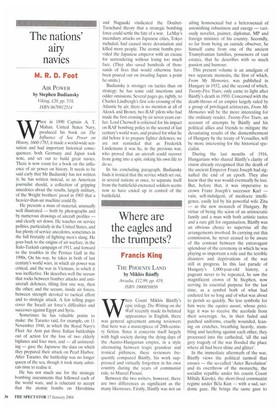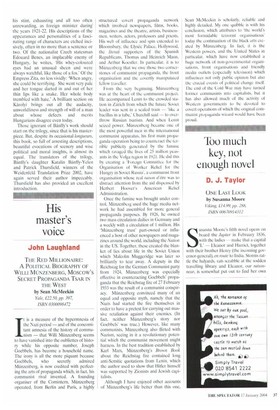Where are the eagles and the trumpets?
Francis King
THE PHOENIX LAND by Miklos !Unify Arcadia, £12.99, pp. 419, ISBN 1900850850 When Count Miklos Banffy's epic trilogy The Writing on the Wall recently made its belated appearance in English, there was general agreement among reviewers that here was a masterpiece of 20th-century fiction. Since it concerns itself largely with high society during the dying days of the Austro-Hungarian empire, in a style alternating between tragic grandeur and ironical pithiness, these reviewers frequently compared Banffy, his work suppressed and virtually forgotten in his own country during the years of communist rule, to Marcel Proust.
Between the two writers, however, there are two differences as significant as the many likenesses. Firstly, 1hr-iffy was not an
ailing homosexual but a heterosexual of astonishing robustness and energy — variously novelist, painter, diplomat, MP and foreign minister of his country. Secondly, so far from being an outside observer, he himself came from one of the ancient Transylvanian families, possessors of vast estates, that he describes with so much passion and humour.
This present volume is an amalgam of two separate memoirs, the first of which, From My Memories, was published in Hungary in 1932, and the second of which, Twenty-Five Years, only came to light after Banffy's death in 1950. Concerned with the death-throes of an empire largely ruled by a group of privileged aristocrats, From My Memories will be the more interesting for the ordinary reader. Twenty-Five Years, an account of attempts by Banfty and his political allies and friends to mitigate the devastating results of the dismemberment of Hungary by the treaty of Versailles, will be more interesting for the historical specialist.
During the last months of 1916, Hungarians who shared Banffy's clarity of vision already recognised that the death of the ancient Emperor Franz Joseph had signalled the end of an epoch. They also knew that the war would eventually be lost. But, before that, it was imperative to crown Franz Joseph's successor Karl — vain, self-indulgent, of mediocre intelligence, easily led by his powerful wife Zita — as the new monarch of Hungary. By virtue of being the scion of an aristocratic family and a man with both artistic tastes and a rare gift for organisation, Banffy was an obvious choice to supervise all the arrangements involved. In carrying out this commission, he never ceased to be aware of the contrast between the extravagant splendour of the ceremony in which he was playing so important a role and the terrible disasters and deprivations of the war still in progress. In this last parade of Hungary's 1,000-year-old history, a pageant never to be repeated, he saw the magnificent crown of St Stephen, now serving its essential purpose for the last time, as a symbol both of what had endured for so long and of what was about to perish so quickly. No less symbolic for him were the equites aurati, whose privilege it was to receive the accolade from their sovereign. As, in their faded and patched uniforms, cruelly wounded, leaning on crutches, breathing heavily, stumbling and lurching against each other, they processed into the cathedral, 'all the sad grey tragedy of the war flooded the place where all had been shine and glitter'.
In the immediate aftermath of the war, Banffy views the political turmoil that ensues — the so-called 'Aster Revolution' and its overthrow of the monarchy, the socialist republic under his cousin Count Mihaly Karolyi, the short-lived communist regime under Bela Kun — with a sad, sardonic gaze. He brings the same gaze to his stint, exhausting and all too often unrewarding, as foreign minister during' the years 1921-22. His descriptions of the appearances and personalities of a fascinating range of characters are etched incisively, often in no more than a sentence or two. Of the nationalist Czech statesman Edouard Benes, an implacable enemy of Hungary, he writes, 'His whey-coloured eyes had an unusual sheen and were always watchful, like those of a fox.' Of the Empress Zita, no less vividly: 'When angry, she could be terrifying. She went very pale and her tongue darted in and out of her thin lips like a snake. Her whole body trembled with hate.' A brilliant section on Karolyi brings out all the audacity, unworldliness and strength of will of a man about whose defects and merits Hungarians disagree even today. Those ignorant of Banffy's work should start on the trilogy, since that is his masterpiece. But, despite its occasional longueurs, this book, so full of arresting descriptions, beautiful evocations of scenery and wise political and moral insights, is almost its equal. The translators of the trilogy, Banffy's daughter Katalin Bariffy-Yelen and Patrick Thursfield, winners of the Weidenfeld Translation Prize 2002, have again served their author impeccably. Thursfield has also provided an excellent introduction.



































































 Previous page
Previous page